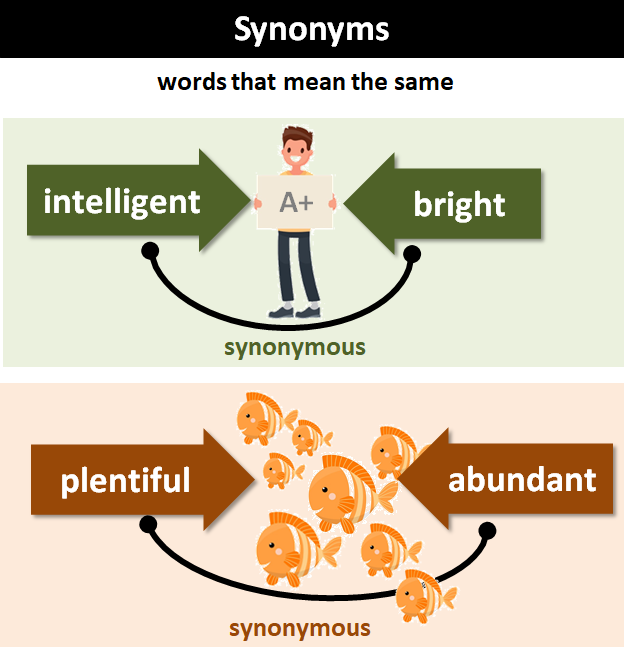Synonyms
A synonym is a word or phrase that means the same (or very nearly the same) as another word or phrase. Words that are synonyms are described as synonymous.

Easy Examples of Synonyms
- He is happy /glad.
- Actress Kate Beckinsale studied / read French and Russian literature at Oxford.
Bear in mind that synonyms in one context might not be synonyms in another.
- He studied / read in the kitchen.
More Examples of Synonyms
Synonyms usually relate to adjectives, adverbs, nouns, or verbs. However, they can be any part of speech.
- The reason is unimportant.
- The reason is irrelevant.
- He eats fast.
- He eats quickly.
- Shall I take the dogs?
- Shall I take the mutts?
- I need to contemplate the consequences.
- I need to consider the consequences.
- I should tell her as she is my sister.
- I should tell her because she is my sister.
- Yes, Captain.
- Aye, Captain.
- Upon arrival, take a ticket.
- On arrival, take a ticket.
- I’ll show you my yacht “Unsinkable II”. She is a beauty.
- I’ll show you my yacht “Unsinkable II”. It is a beauty.
Synonyms Contrast with Antonyms.
Synonyms contrast with antonyms. Antonyms are words with opposite meanings, making them the opposite of synonyms. For example:
- “Bad” is an antonym of “good.”
- “Coward” is an antonym of “hero.”

Examples of Synonyms and Antonyms.
The table below shows some examples of synonyms and antonyms.
| Word | Synonym | Antonym |
|---|---|---|
| always | forever | never |
| blend | mix | separate |
| clarify | explain, simplify | confuse |
| defend | protect, shield | attack, assault |
| enemy | foe, opponent | ally, friend |
| false | incorrect, untrue | true |
| gather | collect, accumulate | scatter, disperse |
| humble | modest | vain |
| irritate | annoy, agitate, provoke | soothe, calm |
| jubilant | delighted, elated, overjoyed | dejected, depressed |
| kind | considerate, tender, thoughtful | mean, cruel, inconsiderate |
| loose | slack, limp | tight |
| maximum | greatest, highest, uppermost | minimum, least |
Read more about antonyms.
Try a drag-and-drop test on synonyms and antonyms.
Why Should I Care about Synonyms?
There are three good reasons and one bad reason to care about synonyms:
(Good Reason 1) To keep your writing interesting
Repeating the same word can make writing dull.
- Thank you for your cooperation. We would have failed without your cooperation.
Keep your writing interesting by creating some literary variance with synonyms.
- Thank you for your assistance. We would have failed without your cooperation.
(You don’t have to achieve literary variance as you’re typing. Just repeat the word and then let your thesaurus earn its living.)
(Good Reason 2) To fine-tune your communications
Remember that synonyms are words that mean, or very nearly mean, the same. Those differences can be important. Recognizing the different connotations (i.e., the implied meanings) of synonyms will help you nail the right word, be it in a poem or a business letter.
- The pond was dark /murky.
(Good Reason 3) To find a rhyming, rhythmic, or alliterative word
To find a word that fits your needs poetically, put a synonym and then use your thesaurus to hunt down a better-fitting synonym.
- A piece shard of shrapnel shaved her shoulder blade.
(Bad Reason 1) To avoid a word you can’t spell
According to Musician Burt Bacharach, a synonym is “a word you use when you can’t spell the first word you thought of.” (He was joking, of course.)
- My conscence consiance integrity won’t allow it.
It’s hard to condone this reason, but, hey, it’s not unhelpful.
Key Points
- Use synonyms to apply literary variance.
- Use the subtle differences in synonyms to fine-tune your message.
- Use your thesaurus to find the word that fits your needs poetically.
